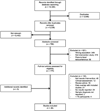Emerging mHealth and eHealth interventions for serious mental illness: a review of the literature
- PMID: 26017625
- PMCID: PMC4924808
- DOI: 10.3109/09638237.2015.1019054
Emerging mHealth and eHealth interventions for serious mental illness: a review of the literature
Abstract
Background: Serious mental illness (SMI) is one of the leading causes of disability worldwide. Emerging mobile health (mHealth) and eHealth interventions may afford opportunities for reaching this at-risk group.
Aim: To review the evidence on using emerging mHealth and eHealth technologies among people with SMI.
Methods: We searched MEDLINE, PsychINFO, CINAHL, Scopus, Cochrane Central, and Web of Science through July 2014. Only studies which reported outcomes for mHealth or eHealth interventions, defined as remotely delivered using mobile, online, or other devices, _targeting people with schizophrenia, schizoaffective disorder, or bipolar disorder, were included.
Results: Forty-six studies spanning 12 countries were included. Interventions were grouped into four categories: (1) illness self-management and relapse prevention; (2) promoting adherence to medications and/or treatment; (3) psychoeducation, supporting recovery, and promoting health and wellness; and (4) symptom monitoring. The interventions were consistently found to be highly feasible and acceptable, though clinical outcomes were variable but offered insight regarding potential effectiveness.
Conclusions: Our findings confirm the feasibility and acceptability of emerging mHealth and eHealth interventions among people with SMI; however, it is not possible to draw conclusions regarding effectiveness. Further rigorous investigation is warranted to establish effectiveness and cost benefit in this population.
Keywords: eHealth; mHealth; mental health; mobile health; remote technology; serious mental illness.
Similar articles
-
Acceptability of Interventions Delivered Online and Through Mobile Phones for People Who Experience Severe Mental Health Problems: A Systematic Review.J Med Internet Res. 2016 May 31;18(5):e121. doi: 10.2196/jmir.5250. J Med Internet Res. 2016. PMID: 27245693 Free PMC article. Review.
-
Comparing a Smartphone Program with a Peer-Led Program to Help People with Serious Mental Illness Manage Their Symptoms [Internet].Washington (DC): Patient-Centered Outcomes Research Institute (PCORI); 2019 Apr. Washington (DC): Patient-Centered Outcomes Research Institute (PCORI); 2019 Apr. PMID: 36701498 Free Books & Documents. Review.
-
Online and mobile technologies for self-management in bipolar disorder: A systematic review.Psychiatr Rehabil J. 2017 Sep;40(3):309-319. doi: 10.1037/prj0000270. Epub 2017 Jun 8. Psychiatr Rehabil J. 2017. PMID: 28594196 Review.
-
Effectiveness of eHealth and mHealth Interventions Supporting Children and Young People Living With Juvenile Idiopathic Arthritis: Systematic Review and Meta-analysis.J Med Internet Res. 2022 Feb 2;24(2):e30457. doi: 10.2196/30457. J Med Internet Res. 2022. PMID: 35107431 Free PMC article. Review.
-
Digital smartphone intervention to recognise and manage early warning signs in schizophrenia to prevent relapse: the EMPOWER feasibility cluster RCT.Health Technol Assess. 2022 May;26(27):1-174. doi: 10.3310/HLZE0479. Health Technol Assess. 2022. PMID: 35639493 Free PMC article. Clinical Trial.
Cited by
-
Wearable Devices and Smartphones for Activity Tracking Among People with Serious Mental Illness.Ment Health Phys Act. 2016 Mar;10:10-17. doi: 10.1016/j.mhpa.2016.02.001. Ment Health Phys Act. 2016. PMID: 27134654 Free PMC article.
-
Web-Based Self-Management Programs for Bipolar Disorder: Insights From the Online, Recovery-Oriented Bipolar Individualised Tool Project.J Med Internet Res. 2018 Oct 24;20(10):e11160. doi: 10.2196/11160. J Med Internet Res. 2018. PMID: 30355553 Free PMC article.
-
Single-Session Mobile-Augmented Intervention in Serious Mental Illness: A Three-Arm Randomized Controlled Trial.Schizophr Bull. 2019 Jun 18;45(4):752-762. doi: 10.1093/schbul/sby135. Schizophr Bull. 2019. PMID: 30281086 Free PMC article. Clinical Trial.
-
Provision of Digital Health Technologies for Opioid Use Disorder Treatment by US Health Care Organizations.JAMA Netw Open. 2023 Jul 3;6(7):e2323741. doi: 10.1001/jamanetworkopen.2023.23741. JAMA Netw Open. 2023. PMID: 37459098 Free PMC article.
-
Experience sampling methodology in mental health research: new insights and technical developments.World Psychiatry. 2018 Jun;17(2):123-132. doi: 10.1002/wps.20513. World Psychiatry. 2018. PMID: 29856567 Free PMC article.
References
-
- Acosta FJ, Bosch E, Sarmiento G, et al. Evaluation of noncompliance in schizophrenia patients using electronic monitoring (MEMS®) and its relationship to sociodemographic, clinical and psychopathological variables. Schizophrenia Research. 2009;107(2–3):213–217. - PubMed
-
- Alvarez-Jimenez M, Alcazar-Corcoles M, González-Blanch C, et al. Online, social media and mobile technologies for psychosis treatment: a systematic review on novel user-led interventions. Schizophrenia Research. 2014;156(1):96–106. - PubMed
-
- Alvarez-Jimenez M, Bendall S, Lederman R, et al. On the HORYZON: moderated online social therapy for long-term recovery in first episode psychosis. Schizophrenia Research. 2013;143(1):143–149. - PubMed
-
- Baikie KA, Geerligs L, Wilhelm K. Expressive writing and positive writing for participants with mood disorders: an online randomized controlled trial. Journal of Affective Disorders. 2012;136(3):310–319. - PubMed
Publication types
MeSH terms
Grants and funding
LinkOut - more resources
Full Text Sources
Other Literature Sources
Medical


